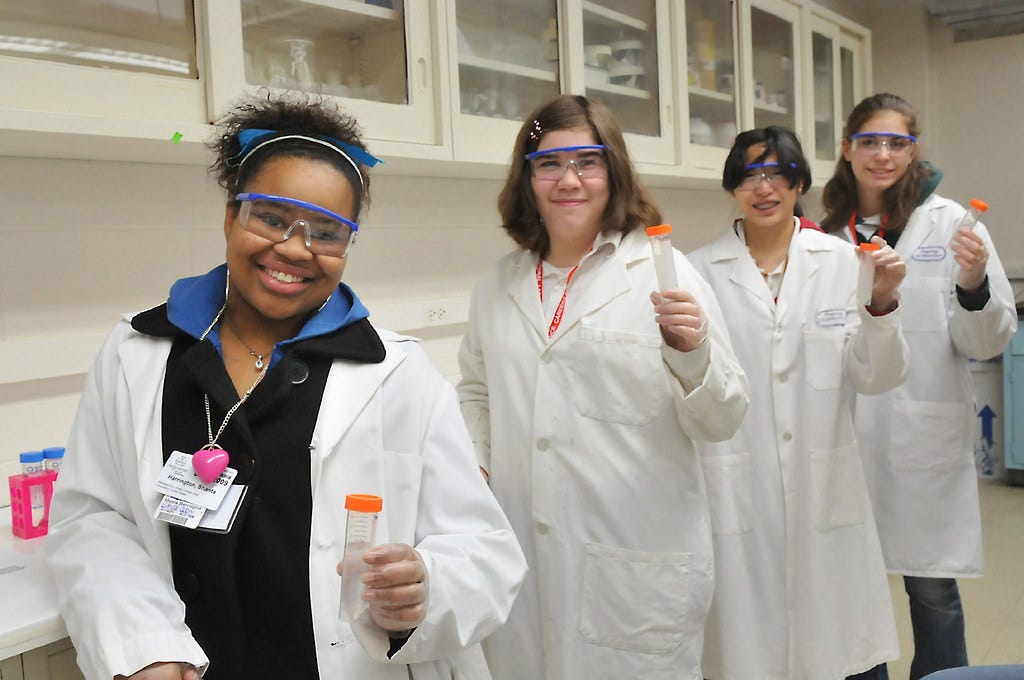Women in Science: Addressing Underrepresentation and Paving the Way Forward

Science has long been a field marked by groundbreaking discoveries, innovation, and relentless pursuit of knowledge. There is growing recognition of the critical role and importance that diversity plays in driving scientific innovation and discovery (see here, here, here). Groups and teams of people with diverse perspectives, experiences, and areas of expertise tend to be more creative and innovative, and make better decisions and more inspired problem-solving (here, here).
Diversity in any field is not just a matter of fairness. In science, it enhances the quality and impact of research. Diverse teams bring a variety of perspectives and ideas, leading to more innovative solutions and discoveries. Yet women are under-represented in science, technology, engineering, and mathematics (STEM) fields.
The Scope of Underrepresentation of Women in STEM
Despite significant progress, women in science continue to face challenges and remain underrepresented in many scientific fields, particularly in higher academic and leadership positions (here, here).
Data from the U.S. Census Bureau indicates that while women have made gains in STEM occupations, their representation remains disproportionately low. As of 2019, women made up nearly half of the overall U.S. workforce but only 27% of the STEM workforce. This marks an increase from 8% in 1970, but the field is still predominantly male (Census.gov).
A 2024 article from the U.S. Department of Commerce also highlights the ongoing challenges faced by women in STEM. It notes that despite efforts to encourage gender diversity, women in these fields often lack visible role models and face structural barriers that impede their progress. The article stresses the need for more inclusive policies and support systems to ensure that women can thrive in STEM careers (U.S. Department of Commerce).
A 2023 United Nations report emphasized the importance of increasing the number of women in STEM, noting that “Gender bias in science has resulted in drug tests that treat the female body as an aberration, and search algorithms that perpetuate discrimination.” In his 2024 message for Internationl Day for Women and Girls in Science, UN Secretary-General António Guterres noted that “Gender equality in science is vital for building a better future for all. Unfortunately, women and girls continue to face systemic barriers and biases that prevent them from pursuing careers in science. This deprives our world of great talent.” He called for concrete actions to support women and girls in STEM, including educational reforms and mentorship programs (UN News).
Some Data on the Gap
Global Representation: Women are underrepresented in STEM occupations globally, making up only 29.2% of the STEM workforce in 146 countries evaluated in the 2023 Global Gender Gap Report.
Field-Specific Data: Representation of women in STEM varies across job categories. According to the Pew Research Center, in the U.S. women's representation is notably lower than men’s in fields such as physics, computer science, and engineering. Women make up only about 15% of engineering jobs. They are better represented in the life sciences, where they account for nearly half the jobs (here). Gender segregation is best seen in health-related jobs, where women make up nearly 75% of the workforce (see page 7 here).
Academic and Professional Positions: Women are underrepresented in senior academic and leadership positions (here). In corporate America, women hold a vastly smaller percentage of leadership positions than men in various sectors. For women of color, the climb to be equally represented in leadership roles has lagged even more (here).
Educational Attainment: In higher education, women earn a significant proportion of undergraduate degrees in STEM fields, but their numbers decrease at the postgraduate and doctoral levels. For instance, women earn about 35% of PhDs in STEM fields (here) .
Funding Disparities: Women researchers are less likely to receive large grants compared to their male counterparts, which can impact their research productivity and career advancement. (here, here)
Nobel Prize: The gender gap in Nobel laureates is enormous, especially in chemistry, physics and economics, where less than five percent of all winners have been female (here). [Interesting factoid: Marie Curie was the first female scientist to receive the Nobel Prize in 1903 and to this day, she's the only woman to be honored twice. There have been a total of 65 female Nobel laureates in the prize's long history, most of them in the peace and literature categories.]
Bottom Line
Women in science continue to face challenges, yet their contributions are indispensable to the advancement of human understanding and technological progress. And representation matters: seeing women succeed in science can inspire and encourage the next generation of female scientists.
Considerable challenges remain. Addressing this gender disparity requires concerted efforts from educational institutions, employers, and policymakers. Initiatives such as targeted scholarships, mentorship programs, and policies promoting work-life balance are crucial for supporting women throughout their scientific careers.
Promoting gender equality in science is an ethical imperative and a practical necessity for advancing knowledge and improving societal well-being. By continuing to challenge stereotypes, provide support, and implement equitable policies, we can create a future where the contributions of women in science are recognized and celebrated as a fundamental part of our collective intellectual and practical progress.
That’s it for today - Thank you so much for reading SciLight!
If you enjoyed today’s post, please like it or share it with others. You can also support the work we do to shine a light on the politicization of science by becoming a paid subscriber!
If you want to share today’s post as a web page with your network, click this button:
If you have suggestions, questions, comments, or want to drop us a line - send it all to scilightsubstack@gmail.com




